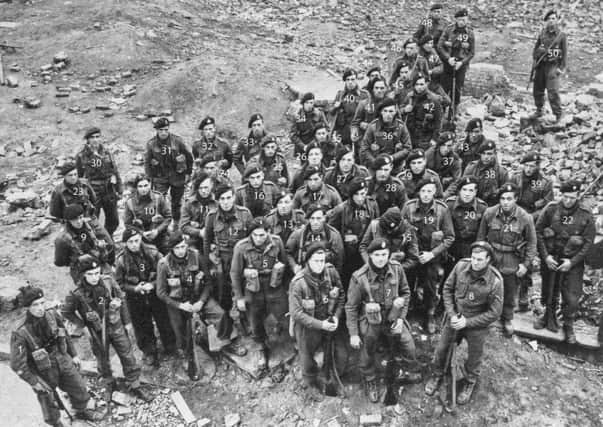Obituary: John White, commando at Dieppe and on D-Day


John White was believed to be the last surviving British commando who fought alongside the legendary Scottish Brigadier the Lord Lovat, chief of the Clan Fraser, in both the disastrous 1942 raid on Dieppe and the successful 1944 D-Day landings. As a 19-year-old trooper in the British army’s 3 Commando, White took part in the ill-fated 19 August 1942 attack in Nazi-occupied France – Churchill’s Operation Jubilee. It lasted little more than six hours, but long enough to leave more than 1,100 allies dead, mostly Canadians but also many British commandos and U.S. Army Rangers.
White and 3 Commando landed on what was codenamed Yellow Beach 1 at Berneval-le-Grand, while Lord Lovat’s 4 Commando came ashore further west at Orange Beach 2. The raid turned out to be a disaster, with the Germans driving the allied force back to the Channel within only six hours.
Advertisement
Hide AdAdvertisement
Hide AdTrooper White and 3 Commando, on the extreme eastern flank of the assault force, took their first casualties when their landing craft were fired upon by a German convoy – a tanker and armed trawlers. The survivors continued their mission, 120 commandos wading ashore carrying fold-up bicycles as well as heavy mortars and 70-pound backpacks. Their task was to knock out a German gun position, known as the Goebbels Battery. They did distract the battery enough to save the lives of many allies on the beaches and on naval craft but were eventually forced to withdraw with the rest of the assault force back across the Channel.
Further west, at Orange Beach 2 near Varengeville, Lord Lovat’s 4 Commando managed to destroy a battery of six German 150mm artillery guns before pulling out, the only single successful attack of the entire raid for which Lord Lovat was awarded the Distinguished Service Order.
Less than two years after the raid, White landed on Sword Beach, Normandy, on D-Day, 6 June 1944. By then a sergeant, he and his 3 Commando were part of the 1st Special Service Brigade commanded by Lord Lovat. While advancing from the Normandy beaches, White navigated his 36 men from 4 Troop 3 Commando out unscathed after getting trapped in a minefield.
Lord Lovat, who famously had his personal piper Bill Millin pipe the first wave of commandos ashore to Hielan’ Laddie, was badly wounded six days after D-Day, ending his war. John White served in North Africa, Gibraltar, Sicily, mainland Italy, France and finally Germany. In 2014, on the anniversary of D-Day, France granted him its highest honour, Grand Cross of the Legion of Honour.
John White was born in Shoreditch, North London, on 27 April, 1923. He helped his father as a carpenter before becoming a “barrow boy,” selling fruit and vegetables outside the Sutton Arms pub in Southchurch Road, Southend-on-Sea. He enlisted in the army in August 1940, aged 17, joining the Bedfordshire and Hertfordshire Regiment with the service number 5958390 and quickly being selected for 3 Commando. He was still only 19 when he was told 3 Commando would take part in Operation Jubilee at Dieppe.
Having regrouped in Weymouth after the failed raid, White and 3 Commando were sent to Gibraltar in January 1943 in case the Germans opted to invade Spain. White and 4 Troop 3 Commando were among the first Britons to land near Cassibile, just south of Syracuse on the Sicilian coast, in July 1943.
They knocked out an Italian artillery battery, captured Cassibile and moved on to take the Ponte dei Malati, a key bridge which they held until the arrival of the of the British 50th Division under General Bernard Montgomery. After the war, the Italians named it the 3 Commando Bridge in their honour.
On October, 1943, White and 3 Commando, along with 40 Commando of the Royal Marines, joined the invasion of mainland Italy by capturing the Adriatic port of Termoli, securing a key bridgehead for the allies. Shortly afterwards, 3 Commando were ordered to return to the UK to prepare for D-Day. White landed on Sword Beach that day, 6 June, his mission to attack the Germans’ Merville Battery, which was pouring fire on the allies on the beaches. After assembling behind a hedgerow 300 yards from the battery, he and 4 Troop, along with 5 Troop, captured and silenced the big guns before being dislodged by a German counter-assault in which fixed bayonets were used.
Advertisement
Hide AdAdvertisement
Hide AdWhite and his troop pushed on to what is now known as Pegasus Bridge, linking up with his commander Lord Lovat as well as the British 6th Airborne Division who had captured the bridge in a dramatic glider-borne assault at dawn on D-Day. Sergeant White would later go on through France and, on 29 April 1945, across the river Elbe into Germany.
John White is survived by his wife Violet, children Bill, Nick, Shanie and Cheryl, five grandchildren and six great grandchildren.